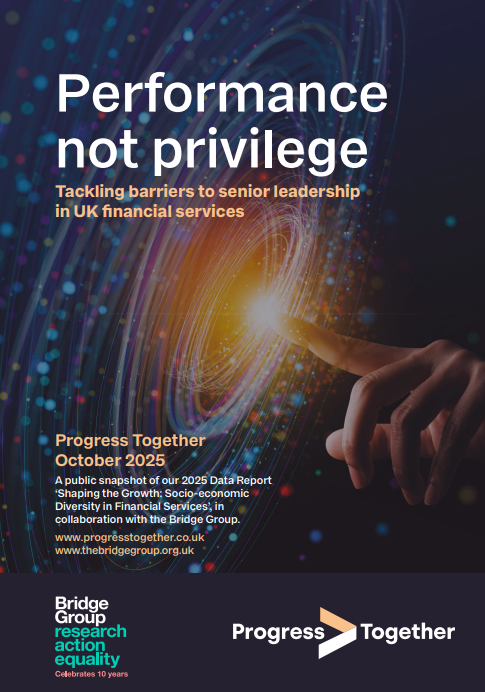New research for Progress Together: Performance, not privilege
Performance, not privilege
Financial services employees from a lower socio-economic background face nearly two years longer to progress than their peers from privileged backgrounds
01 October 2025
Socio-economic background remains the single strongest predictor of who reaches senior leadership in UK financial services, according to new data released today by the Bridge Group and Progress Together at a roundtable hosted at the Bank of England.
The newly released dataset – the largest of its kind globally, spanning over 210,000 employees across 40 firms – reveals entrenched barriers: employees from lower socio-economic backgrounds take 16% longer to progress into senior roles than peers from privileged backgrounds. Senior leadership continues to be dominated by privileged backgrounds, with diverse talent pipelines stalling before the top.
“This year’s dataset shows progress is too slow, regional gaps persist, and privilege still dominates the top jobs. Successful, performance-driven firms will be those turning data into action – embedding accountability, evidence-backed interventions, and inclusion as levers for growth. At this critical juncture for the sector, the time for accelerating action on socio-economic inclusion is now.”
Jenny Baskerville, Chief Executive, the Bridge Group
“Financial services is a powerhouse of the UK economy, but its future competitiveness depends on whether we unlock talent from every background. Right now, too much potential is being wasted: that is not just unjust – it is economically self-defeating. We must ensure socio-economic inclusion is a central driver of growth. If we miss it, we risk entrenching old patterns that hold back both people and productivity.”
Vincent Keaveny CBE, Chair, Progress Together and Former Lord Mayor of London
The dataset highlights that:
In more than half of firms, no senior leaders come from both an ethnic minority and a lower or intermediate socio-economic background.
Men from higher socio-economic backgrounds are 3.4x more likely to reach senior roles than women from lower socio-economic backgrounds.
London, the least socio-economically diverse region, accounts for more than half of senior jobs, blocking talent from other regions.
The findings are today being discussed at a senior leaders' roundtable at the Bank of England, where senior leaders from Morgan Stanley, BlackRock, Fidelity International, Santander, Phoenix, LV and St. James’s Place amongst others join to discuss how to close progression gaps, harness AI-driven workforce transformation, and ensure the future of financial services is defined by performance, not privilege.
Calls for policy and regulatory change
Progress Together and the Bridge Group are urging government, regulators, and industry to act decisively:
Leverage inclusion for growth: Government to embed socio-economic diversity in national and local growth and skills strategies, ensuring that upskilling and reskilling programmes actively reach people from all backgrounds.
Regulatory alignment: The Financial Conduct Authority (FCA) to include socio-economic background explicitly within their non-financial misconduct guidance, making it clear that exclusionary practices are not compatible with cultural transformation.
Diversify leadership pipelines: Employers to require executive search firms to play their part in broadening candidate pools for senior roles. A practical guide, developed by Progress Together and AESC aims to drive change in recruitment practices.
Download the public report
The public report findings provide a socio-economic snapshot for financial services, giving press, policymakers, and stakeholders an accessible overview.
This year’s report analyses employees’ socio-economic background data from 40 firms. The main indicator is the occupation of the household’s main earner at age 14 - a widely recognised measure of socio-economic background. Some firms also report school type to reflect educational advantage. The report uses medians of firm-level statistics to benchmark against sector and national figures. Now in its third year, the report also tracks progress. Early trends are emerging, but more years of data are needed for robust conclusions.
Need for urgent action
Progress Together and the Bridge Group warn that without urgent action, UK financial services risk entrenching privilege at the top, wasting talent, and weakening competitiveness at a time of rapid workforce transformation. The opportunity to rebuild the workforce more inclusively has never been greater. According to the Financial Services Skills Commission, 260,000 skilled workers are expected to exit the sector by 2035 through retirement and attrition.
The findings mirror wider trends recently revealed by the Sutton Trust: Britain’s top jobs remain dominated by the privately educated, who are still five times more likely to reach positions of power.
About Progress Together
Progress Together is the UK’s membership body dedicated to driving socio-economic diversity and progression in financial services. Progress Together was formed in 2022 in response to a Government-backed taskforce, commissioned by HM Treasury and BEIS.
You can find out more about Progress Together’s members and supporters on their website. The full report is available exclusively to Progress Together members - offering detailed benchmarking and firm-level insights from over 210,000 employees across the sector. By joining Progress Together, firms gain access to these insights and participate in the annual data exercise, shaping the evidence base and accelerating sector-wide transformation.

